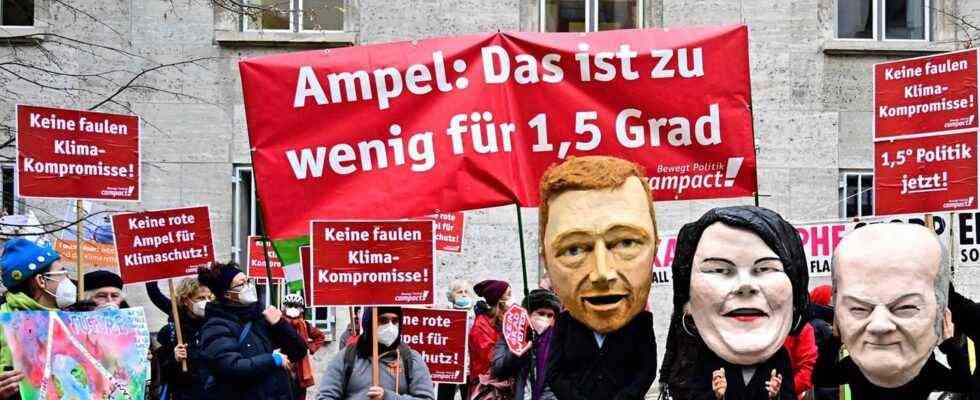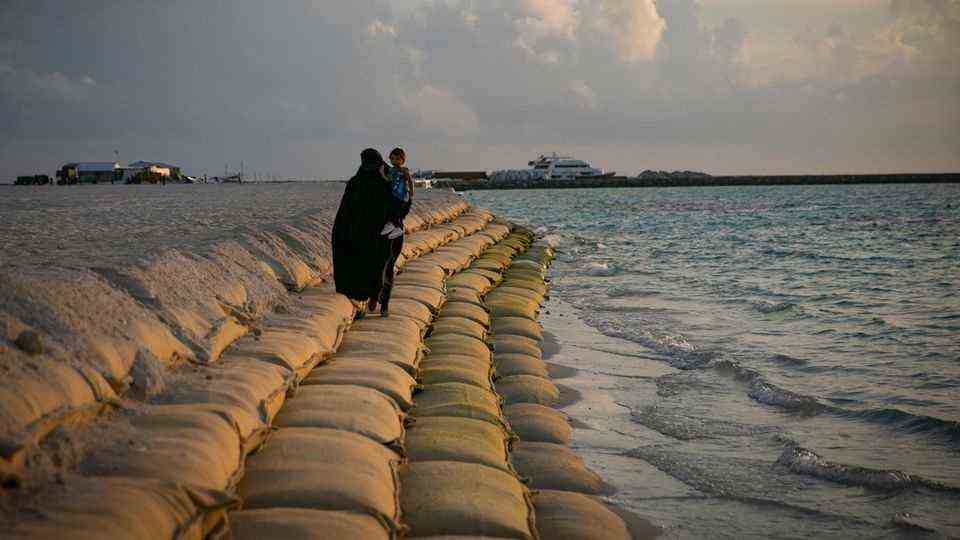analysis
Balance of the COP26
Success or just “blah blah”? Such is the situation after the world climate summit in Glasgow
Campact demonstration during the coalition negotiations: The implementation of the Glasgow climate resolutions is also a major challenge for the future federal government.
© Tobias Schwarz / AFP
It was clear to experts: The expectations of the world climate summit were so high that they could hardly be met. Climate activist Greta Thunberg called the COP26 a big “blah blah”. Climate experts, on the other hand, emphasize progress. A balance sheet.
The COP26 in Glasgow is history – and the reactions could hardly be more different. Those who had expected the world to be saved in the face of the worsening climate crisis reacted deeply disappointed. Activists from “Fridays for Future” spoke of “Blablabla” (Greta Thunberg) and “Fraud against all young people in this world” (Luisa Neubauer). Experts who know what kind of thick boards have to be drilled on the world climate summit in order to bring the countless interests of almost 200 participating nations under one roof, on the other hand, prefer to emphasize the progress. Because that was definitely there in Glasgow. But are they enough to curb global warming to a tolerable level?
COP26: Resolutions are not enough
At least on this point, negotiating delegations, activists, scientists and politicians are likely to largely agree. Nobody seriously denies that, on the basis of the resolutions passed in Glasgow, the targeted climate target from the Paris Agreement of 1.5 degrees global warming compared to the pre-industrial era will not be achieved. “We must not kid ourselves: we have not beaten climate change,” stated Great Britain’s Prime Minister Boris Johnson at the end of COP26 on Friday, but at the same time expressed the hope that “we will look back on COP26 in Glasgow as the beginning of the end of climate change. “
Where does Johnson get this hope from? “This climate summit has already achieved what such a summit can achieve,” said climate researcher Niklas Höhne from the New Climate Institute, co-author of the world climate reports, on Deutschlandfunk. There have been an abundance of initiatives and announcements that they had “given a push” that something could change, and the final declaration was also for the circumstances under which it came about, namely “that there 190 states agree to everything, every comma But it is stronger than I had thought, “said Höhne, placing the Glasgow resolutions in the context of UN negotiations. But he also stated frankly: “We have not solved the problem with that. Far from being solved. It was only a very, very small step, and actually the world should switch to emergency mode.”
Progress but no emergency mode
But there can be no question of that. And from the perspective of the poorer countries and island states that are already being flooded by rising sea levels or are suffering acutely from droughts or storms exacerbated by man-made climate change, the Glasgow summit failed for that reason alone. “The COP26? Big failure”, stated the Namibian FFF activist Ina Maria Shikongo in the “taz”. “Why can some countries go on as they want and others suffer? Islands like Tuvalu that are booing.” There were more climate sinners at the COP than those affected. “Amazon founder Jeff Bezos and other such people were there. (…) You are the reason that we are not able to achieve the 1.5 degree target,” said Shikongo.
Neither the 1.5 degrees nor the minimum requirement listed in the Paris Agreement as “well below 2.0 degrees”. “We are still on the way towards 2.7 degrees global warming,” said Greta Thunberg on Sunday evening on Swedish TV SVT with the summit resolutions. “We are far from what is needed.” The agreement reached in Glasgow to phase out coal and the will to reduce global greenhouse gas emissions by 45 percent by 2030 is a good start, according to the 18-year-old founder of the “Fridays for Future” movement. “But we have to understand that the climate crisis is about time. Of course we can make small strides and slowly win. But that’s exactly the same as losing.”
No alternative at all or at all
An assessment that climate negotiators and politicians generally do not share in this absolute sense. Their argumentation: Every small step brings the world at least a little bit further in the fight against the climate crisis. All or nothing is not an alternative and will only make the situation worse. For example, despite all the criticism, most observers consider the COP26 to be a success, because at the summit, important groundwork was set on a number of points. This includes:
- Farewell to coal burning for the first time consensus
- Phase out subsidies for oil, gas and coal
- Clear commitment to the 1.5 degree target
- End for gasoline and diesel cars by 2040
- Stop of oil and gas production
- Reduction of methane emissions by 30 percent
- Exit from deforestation
All points are considered crucial progress; the devil lies in the detail: China and India achieved a reformulation of the coal phase in the final agreement from “phase-out” to the softer “step-by-step reduction”. For some points, there are no specific timeframes. An exit from deforestation, which even Brazil joined, was decided once in 2014 – with no effect. It is questionable that things will turn out differently this time. And as for the commitment to the 1.5 degree target: Wasn’t that clear anyway? The public debate created this impression, but according to the Paris climate agreement, it has so far been about a target well below 2.0 degrees. The fact that this is not enough and that the “ideal” value of 1.5 degrees listed in the agreement is now to be aimed for is therefore considered progress. Just like the commitment of six major automakers, including Mercedes and Ford, to phase out combustion engines by 2040 at the latest. “It is good that climate neutrality is now recognized and is now becoming the norm,” said EU Commission chief Ursula von der Leyen on Monday.

States have to become more ambitious
“This COP has made progress and completed unused tasks. What matters is what happens now in implementation,” said Hans Pörtner, Co-Head of the Impact, Adaptation and Vulnerability Working Group at the “taz” Intergovernmental Panel on Climate Change. How difficult this implementation is can be seen again and again in Germany. The fact that some of the biggest climate offenders like Russia or China show little or no willingness to meet the norm of climate neutrality is considered to be one of the biggest obstacles in the fight against the climate crisis. Pörtner: “Increasing ambitions worldwide is vital.”
Sources: Homepage COP26; Deutschlandfunk; “taz“; DPA news agency



